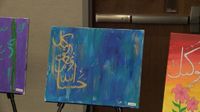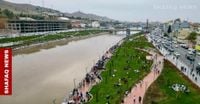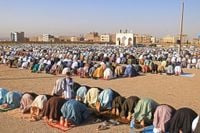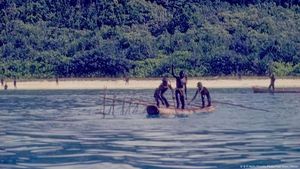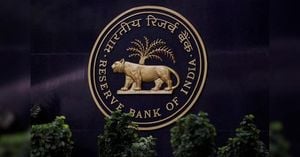The vibrant city of Zakho in the Duhok Governorate of the Kurdistan Region welcomed a remarkable influx of tourists during the recent Eid al-Fitr holiday, with the Tourism Directorate reporting a total of 41,000 visitors. This significant number reflects the city's growing appeal as a holiday destination, drawing both local and international tourists eager to experience its rich culture and scenic beauty.
According to Beora Sindi, the media head of the Tourism Directorate, the breakdown of visitors included approximately 17,000 individuals from the Kurdistan Region and over 22,000 from other Iraqi provinces. Additionally, about 1,150 tourists crossed into Zakho via the Ibrahim al-Khalil border crossing. The Directorate had meticulously prepared for this surge, establishing field committees to monitor tourist sites, ensuring safety and security for all visitors.
Zakho is renowned for its historical significance, cultural heritage, and stunning natural landscapes. Key attractions that draw tourists include the ancient Delal Bridge, the picturesque Zakho Corniche, vibrant markets filled with traditional handicrafts, and the stunning Sharanish Waterfall. The city's welcoming atmosphere, combined with a blend of cultural, historical, and outdoor experiences, has made it a favored destination, particularly during festive periods.
During the same seven-day holiday, the capital of the Kurdistan Region, Erbil, saw an impressive turnout of over 76,000 tourists, while Al-Sulaymaniyah province attracted around 50,000 visitors. This surge in tourism highlights the region's ongoing efforts to promote itself as a premier travel destination.
Meanwhile, in Indonesia, the Eid al-Fitr celebrations also led to a notable spike in demand for beef and buffalo meat. The government faced challenges in meeting this demand due to slow progress in beef imports and rising prices. State-owned enterprises PT Berdikari and PT Perusahaan Perdagangan Indonesia (PPI) were tasked with importing 100,000 tonnes each of beef and buffalo meat. However, by mid-March, Berdikari had imported only 717 tonnes, raising concerns over the sufficiency of meat supplies during the holiday.
The price of beef in local markets has seen an increase, with wet market beef knuckle priced at IDR 150,000 per kg (approximately $14.51 AUD) and supermarket rates remaining stable at IDR 169,900 per kg (around $16.43 AUD) at Farmers Market. Beef carcass prices also rose from IDR 98,000 per kg ($9.45 AUD) last month to IDR 107,000 per kg ($10.35 AUD).
In response to the rising prices, over 2,800 Indonesian post offices were repurposed to offer affordable staples, including frozen meat, at or below government-mandated ceiling prices. For instance, PT PPI sold frozen buffalo meat at Rp 75,000 per kilogram and cooking oil at Rp 14,700 per litre. This innovative approach aims to provide consumers with access to essential food items amidst escalating costs.
As Indonesia grapples with its beef supply challenges, the country's dairy industry is also facing hurdles. The government has set an ambitious goal to import 200,000 dairy cattle by the end of 2025. So far, only 3,000 head have arrived from Australia, with additional imports planned from Brazil, Denmark, Vietnam, and the Netherlands. PT Asia Beef Indonesia (ABI) has committed to importing 20,000 Nelore cattle from Brazil in collaboration with the Ministry of Agriculture.
In the Philippines, the Department of Agriculture is preparing for the commercial release of the African Swine Fever (ASF) AVAC vaccine, developed in Vietnam. This vaccine is expected to allow farmers to source it independently, marking a significant step in the recovery of the hog industry, which has been severely impacted by ASF outbreaks. The government has already initiated a vaccination program targeting 490,000 doses across selected areas, with recent data showing a significant decline in ASF cases.
In addition, the National Dairy Authority (NDA) in the Philippines has confirmed that five new dairy stock farms will become operational by April 2025. These farms, located in Nueva Ecija, Bohol, Bukidnon, Cotabato, and Agusan del Sur, will begin with 50 head of cattle sourced from an upcoming shipment of 600 Australian dairy cattle. The NDA aims to achieve a dairy self-sufficiency rate of 2.5% by the end of 2025, with plans to double that figure by 2028.
Back in the United States, the Muslim community in northeast Tennessee gathered to celebrate the end of Ramadan with an Eid al-Fitr banquet on April 6, 2025. This year's event saw over 400 attendees, surpassing last year's turnout. Rabia Okuyucu, President of the ETSU Muslim Students Association, emphasized the importance of Ramadan as a month of reflection and gratitude. Dr. Shahram Malik, President of the Muslim Community of Northeast Tennessee, highlighted the community's growth and integration into American society, expressing contentment with their lives in the region.
The Eid al-Fitr banquet featured recognition for children who participated in special events during Ramadan, fostering a sense of community and celebration among attendees. This event not only marks the end of a significant religious observance but also serves to strengthen community bonds and promote cultural understanding.
As the world continues to navigate the complexities of cultural celebrations, economic challenges, and community growth, the stories from Zakho, Indonesia, the Philippines, and Tennessee illustrate the diverse ways in which people come together to celebrate, adapt, and thrive amidst changing circumstances.
